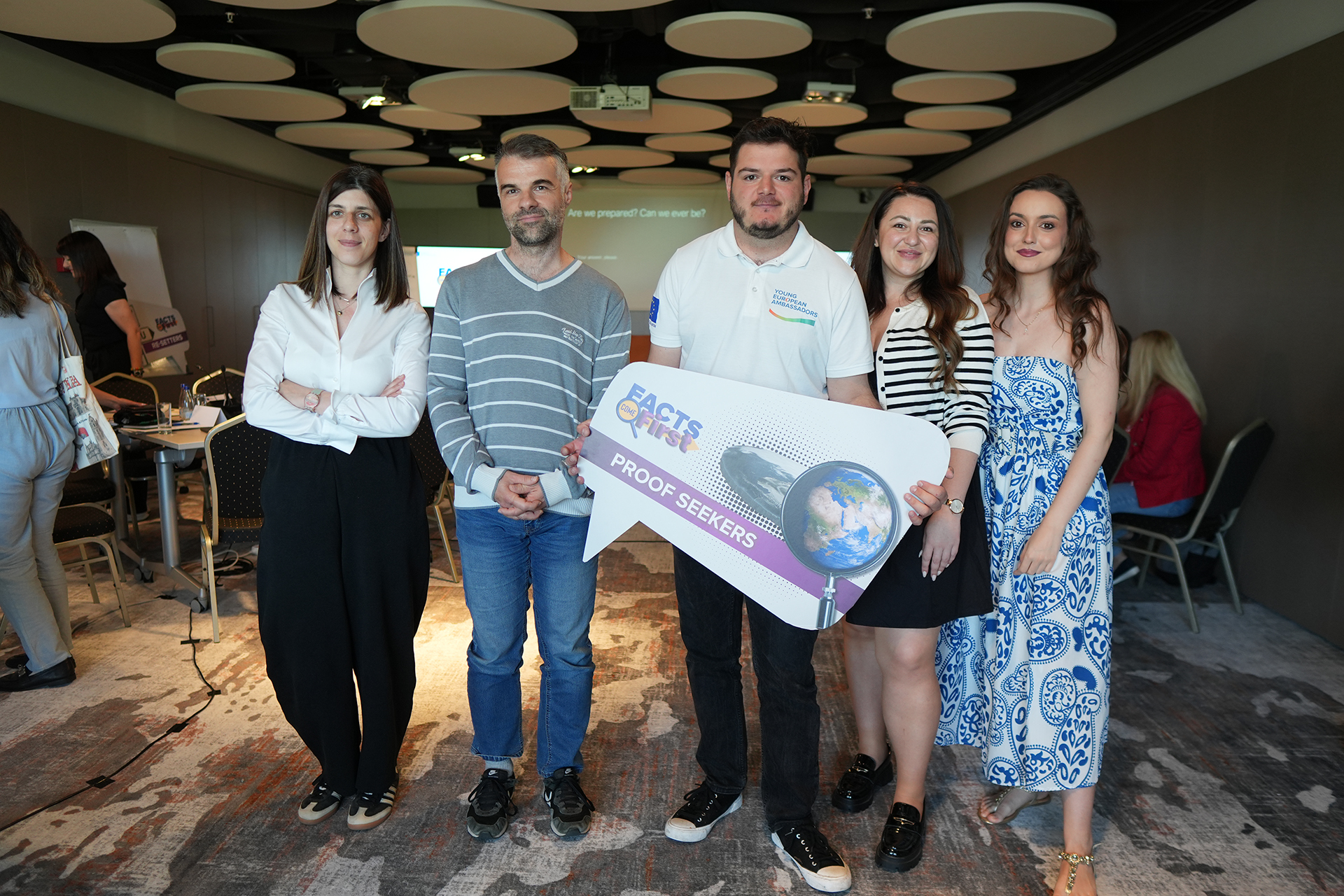
PODGORICA – The European Union, as a political community that upholds the highest standards of human rights and values, is frequently targeted by various actors who, through the dissemination of negative narratives, aim to undermine citizens’ trust in the institutions of this union.
Social networks and dubious media outlets without imprints or professional journalistic standards in Western Balkan countries attempt to manipulate public opinion by appealing to emotions and political developments, turning sentiment against the fulfilment of European standards and the implementation of reforms.
The most common themes found on such websites and social media pages concern the rights of the LGBTQ population and alleged EU efforts to alter traditional norms that the people of the Western Balkans strongly cherish.
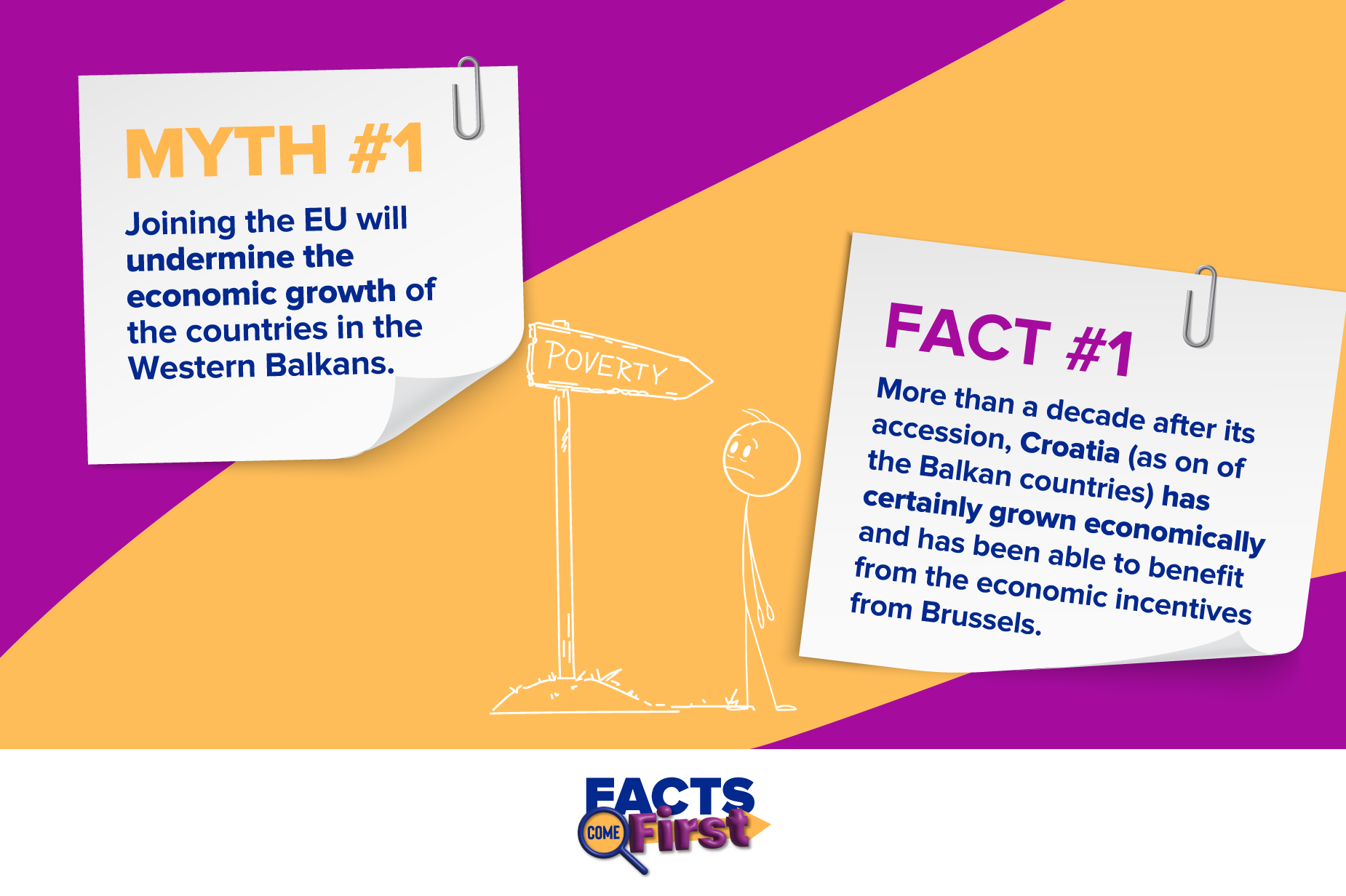
Claims are also often made that EU membership would undermine economic standards and lead to the exploitation of natural resources and other economic potentials in these countries.
One Facebook page from Croatia, with around 1,500 followers, claims that Croatia was economically better off while it was part of the Socialist Federal Republic of Yugoslavia than it is today as an EU member.
“Interpret this as you wish, call me a Yugoslav and attack me, but it must be said: Yugoslavia was a sovereign state, unlike Croatia. Decisions were made by the Croat Josip Broz, not by Brussels or foreign embassies. We had agriculture, shipbuilding, industry, top-tier films and series, and an unmatched music scene. We also had demographic growth and some semblance of moral values, as Western materialism, Coca-Cola culture, promiscuity, liberalism, radical feminism, etc., had not yet arrived. We had optimism in society, smiling faces on the streets, and belief in a better tomorrow,” the post reads.
However, the facts tell a different story, as Croatia received €25 billion from the EU from its accession until the end of 2024, which is about four times more than it contributes. Croatia has a total surplus of € 16.36 billion as the difference between the funds paid to Croatia and its contribution to the EU budget, the Regional Development and EU Funds Ministry’s State Secretary, Domagoj Mikulić, told the parliament on Thursday. The funds withdrawn are four time highers than the country’s contribution to the EU funds since Croatia joined the EU until the end of 2023, said HSLS MP Dario Hrebak during a parliamentary debate, adding that this is also a good message to Eurosceptics.
This money not only helped Croatia improve its standard of living but also to implement reforms that enhanced quality of life. According to EU data, it is clear how much countries have benefited from EU membership.
Another example from the aforementioned propaganda Facebook page tries to establish a narrative that alleged changes in traditional family dynamics within EU member states are leading to the “feminization” of European men. The author refers to media reports claiming that French President Emmanuel Macron was allegedly slapped by his wife.
“The ridiculous EU’s leader was slapped last night by his wife. Can you imagine Putin or Xi getting slapped by their wives? You can’t. And that’s one reason why the decadent EU (unlike the East) is sinking deeper economically and politically. That’s part of the answer to why the EU has become an irrelevant actor in global affairs,” says the Facebook post.
Yet, all such claims are demystified by the clear rules written in the EU’s Founding Treaty.
Article 3 of the Treaty on European Union explicitly states that “the EU shall combat social exclusion and discrimination, promote social justice and protection, equality between women and men, solidarity between generations, and the rights of the child.”
Disinformation narratives are also present in Western Balkan countries that are in the process of joining the EU, such as Montenegro.
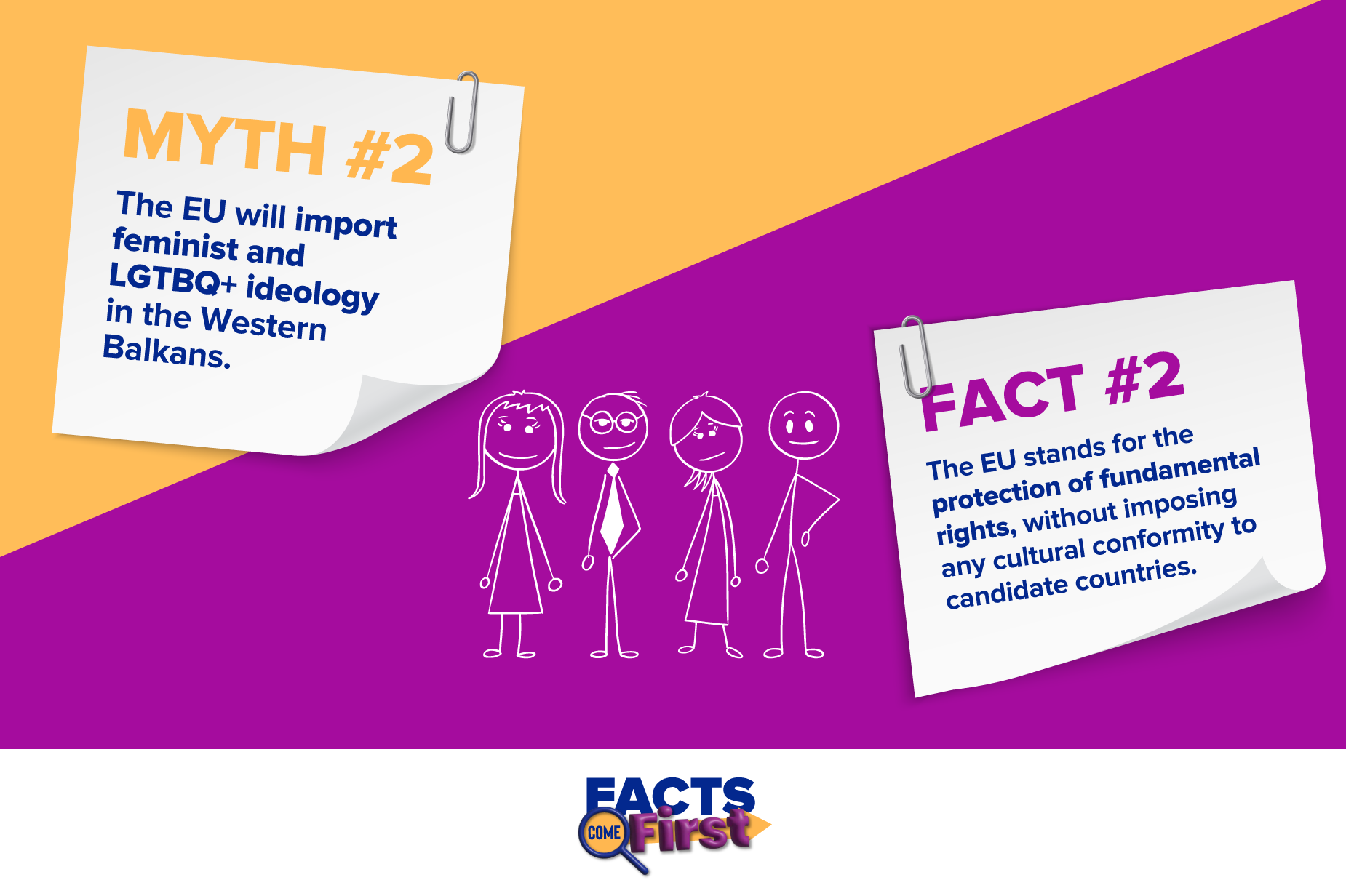
The pro-Russian portal IN4S, which, according to some polls, is the sixth most-read in the country, often spreads similar or identical controversial content.
In one of its articles, IN4S claims that “The city of Rijeka has introduced Health Education as a pilot project in six primary schools,” allegedly not as a classical health program, but as a sexual education course based on a left-liberal model. According to IN4S, the material contains numerous examples of feminist and LGBT propaganda.
Another article from the same outlet said “It’s not a question of whether we’ll join the EU, but what will be left of us if we do.”
It asserts that “Under the guise of fighting for human rights, the EU is increasingly pressuring the educational systems, media, and legal frameworks of member states to accept radical gender theories, while criminally threatening those who challenge these views.”
Hungary is cited as an example, allegedly having faced harsh criticism after passing a law that bans the promotion of LGBT content to children — something Brussels reportedly declared a “violation of European values.”
But what’s the truth?
Very little of these claims hold water, because the EU’s founding acts make it clear that the Union offers support to Member States, but holds no authority over education policy. Member states retain full sovereignty in structuring, organizing, and determining the content of their education systems, including curricula, financing, teacher qualifications, and the language of instruction.
In fact, the EU does not aim to eliminate traditional values. On the contrary, in the preamble to the Treaty on European Union, it explicitly states its intention to:
“Deepen the solidarity among its peoples, while respecting their history, culture, and traditions,” and to “reaffirm its attachment to the principles of liberty, democracy, respect for human rights and fundamental freedoms, and the rule of law.”
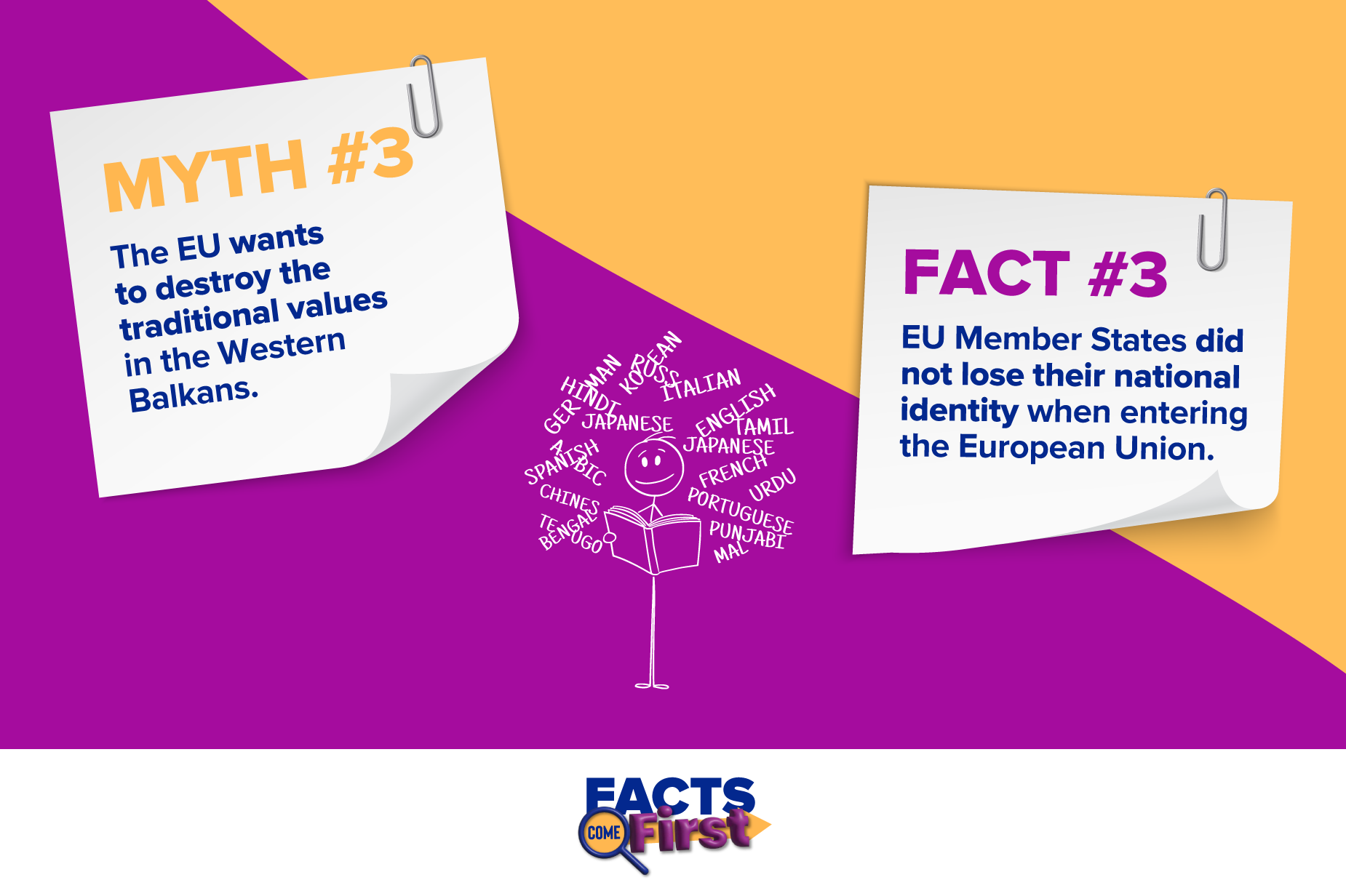
According to Article 6, paragraph 3 of this Treaty said that “fundamental rights, as guaranteed by the European Convention for the Protection of Human Rights and Fundamental Freedoms, and as they result from the constitutional traditions common to the Member States, shall constitute general principles of the Union’s law.”
Furthermore, all decisions are to be made “as closely as possible to the citizen,” following the principle of subsidiarity.
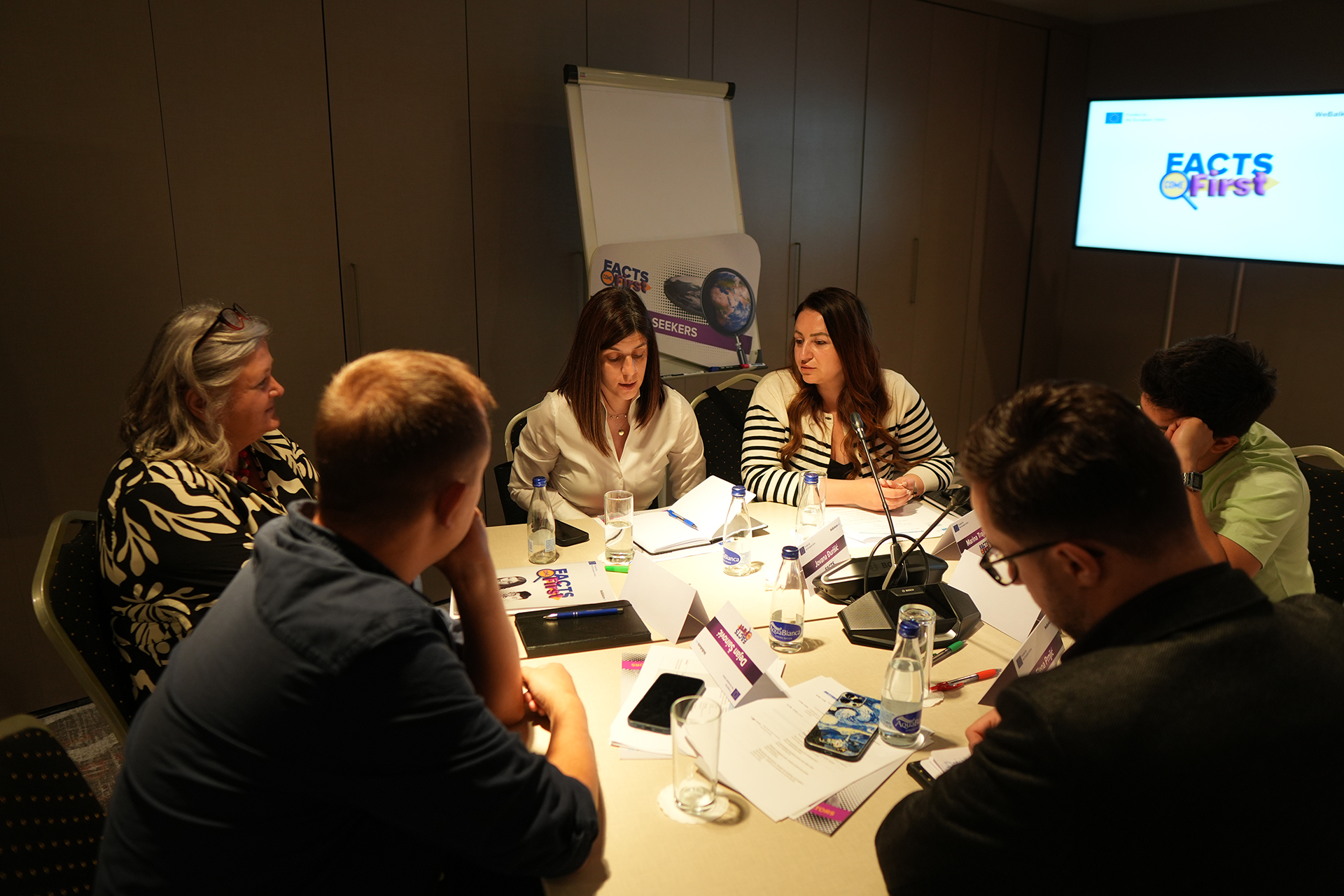
Also, Article 2 of the same document clearly states that the Union is founded on the values of respect for human dignity, freedom, democracy, equality, the rule of law, and respect for human rights, including the rights of persons belonging to minorities.”
These values, as emphasized, “are common to the Member States in a society where pluralism, non-discrimination, tolerance, justice, solidarity, and equality between women and men prevail.”
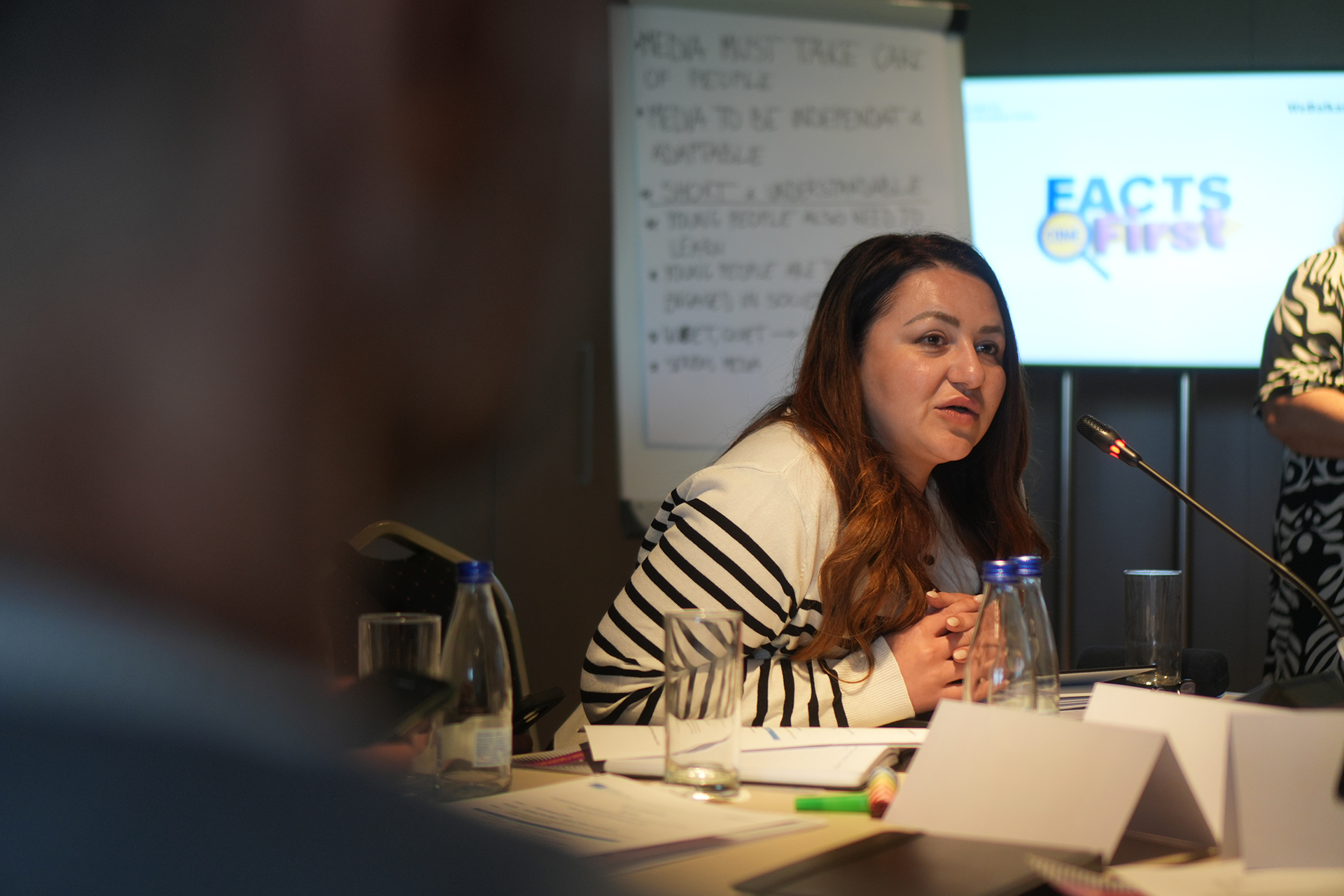
From all the above, it is clear that the Western Balkan countries, once they become EU members, will enjoy the same privileges and rights as all other Member States. Furthermore, as evidenced by the earlier examples, they will also achieve economic progress and an improved standard of living for their citizens.
AUTHORS:
Dejan Šainović, Journalist
Elena Prnjić, Fact checker
Jovana Đurišić, Fact checker
Marina Trajkovska, Influencer
Bojan Ristovski, Young European Ambassador

The pro-Russian portal IN4S, which, according to some polls, is the sixth most-read in the country, often spreads similar or identical controversial content.
In one of its articles, IN4S claims that “The city of Rijeka has introduced Health Education as a pilot project in six primary schools,” allegedly not as a classical health program, but as a sexual education course based on a left-liberal model. According to IN4S, the material contains numerous examples of feminist and LGBT propaganda.
Another article from the same outlet said “It’s not a question of whether we’ll join the EU, but what will be left of us if we do.”
It asserts that “Under the guise of fighting for human rights, the EU is increasingly pressuring the educational systems, media, and legal frameworks of member states to accept radical gender theories, while criminally threatening those who challenge these views.”
Hungary is cited as an example, allegedly having faced harsh criticism after passing a law that bans the promotion of LGBT content to children — something Brussels reportedly declared a “violation of European values.”
But what’s the truth?
Very little of these claims hold water, because the EU’s founding acts make it clear that the Union offers support to Member States, but holds no authority over education policy. Member states retain full sovereignty in structuring, organizing, and determining the content of their education systems, including curricula, financing, teacher qualifications, and the language of instruction.
In fact, the EU does not aim to eliminate traditional values. On the contrary, in the preamble to the Treaty on European Union, it explicitly states its intention to:
“Deepen the solidarity among its peoples, while respecting their history, culture, and traditions,” and to “reaffirm its attachment to the principles of liberty, democracy, respect for human rights and fundamental freedoms, and the rule of law.”

According to Article 6, paragraph 3 of this Treaty said that “fundamental rights, as guaranteed by the European Convention for the Protection of Human Rights and Fundamental Freedoms, and as they result from the constitutional traditions common to the Member States, shall constitute general principles of the Union’s law.”
Furthermore, all decisions are to be made “as closely as possible to the citizen,” following the principle of subsidiarity.

Also, Article 2 of the same document clearly states that the Union is founded on the values of respect for human dignity, freedom, democracy, equality, the rule of law, and respect for human rights, including the rights of persons belonging to minorities.”
These values, as emphasized, “are common to the Member States in a society where pluralism, non-discrimination, tolerance, justice, solidarity, and equality between women and men prevail.”

From all the above, it is clear that the Western Balkan countries, once they become EU members, will enjoy the same privileges and rights as all other Member States. Furthermore, as evidenced by the earlier examples, they will also achieve economic progress and an improved standard of living for their citizens.
AUTHORS:
Dejan Šainović, Journalist
Elena Prnjić, Fact checker
Jovana Đurišić, Fact checker
Marina Trajkovska, Influencer
Bojan Ristovski, Young European Ambassador
Please wait while your video is being uploaded...
Don't close this window!